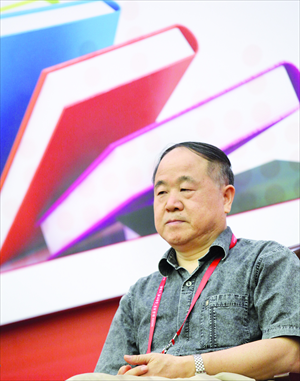Mo excitement

On the eve of the announcement of this year's winner of the Nobel Prize in Literature, debates on Mo Yan, a Chinese author favored by betting agencies as the winner, continue in cyberspace and among the Chinese public.
State-run China Central Television has been invited to Sweden for an interview with the Nobel Prize in Literature winner for the first time in history, the network says.
Only three TV stations worldwide have been granted the opportunity, leaving the Chinese public highly anticipating the announcement.
Since August, the Swedish betting site Unibet has listed Mo as 5.25 to 1 favorite to win, followed by Japanese writer Haruki Murakami at 8 to 1. A British gaming site lists him as the second-most likely contender. An AFP report earlier this month also said either Mo Yan or Hakuri Murakami will likely win the prize.
Although the Nobel Prize panel does not reveal a nominees list until 50 years after they announce a final winner, the betting on Mo has excited the Chinese public, and Mo's books recently become very popular among Chinese readers. Mo, a 57-year-old Shandong native, has been dominating Chinese media headlines, which have been both praising and criticizing the writer who might bring China its first Nobel Prize in Literature.
Debates broke out nationwide, with some people saying Mo is not qualified to win because he has not spoken out about China's major social and historical issues, and he has taken a passive political stance. For example, Mo has been criticized for agreeing to transcribe in his own handwriting for a memorial book about Chairman Mao Zedong one of Mao's speeches that played a central role in the chaotic Cultural Revolution (1966-76). The book was published earlier this year.
Kenzaburo Oe, a Japanese writer and winner of Nobel Prize in Literature in 1994, said that he thought Mo Yan was a very competitive contender for the Nobel Prize, if there were to be another Asian winner.
Chen Maiping, a writer and professor at Stockholm University at Sweden who's been studying the Nobel Prize in Literature, told the Global Times that although betting sites sometimes make wild guesses, Mo's works such as Red Sorghum and The Garlic Ballads have been quite popular in Swedish literacy circles. Life and Death Are Wearing Me Out hit the shelves in Sweden this year, and was highly recommended during the Goteborg International Book Fair.
Mo is known for his social commentary in novels including Red Sorghum (1987), Big Breasts & Wide Hips (1993) and Frog, which tells a story about China's family planning policy. He was born in 1955 in Gaomi township, Weifang city, Shandong Province, where he sets many of his stories, and he is strongly influenced by the political critique in the works of Lu Xun, one of the greatest Chinese writers in history. Starting his writing career in 1981, Mo has won several top Chinese and international prizes including the Nonino International Literature Prize in 2005, and he is currently a deputy chairman of the China Writers Association.
"He is the most qualified Chinese writer likely to win a Nobel Prize, and I tried to gather more people to recommend Mo for the prize by posting a long message in an academic email group in the US several years ago," Yang Xiaobin, a poet and literary critic, told the Global Times.
Mo's works convey powerful critical significance through the depictions of current social problems and historical trauma. He has made breakthroughs in writing style, and his novels reflect China's rural and folk culture, said Yang.
"But unfortunately, only one person in the Nobel jury speaks Chinese," he said, adding that Mo is a Chinese writer with the biggest number of works translated into other languages and introduced into Western countries.
Goran Malmqvist, a sinologist and member of the Swedish Academy, is the only one of the lifelong members of a Nobel Prize review committee who is knowledgeable of Chinese culture and language.
While the Nobel Prize in Literature is recognized as the highest honor for writers, many people in China expressed different opinions, saying judges with the Swedish Academy might not represent the highest level of world literature, and that they can't understand Chinese literature through translations.
Many writers, literature critics and commentators have raised support for Mo through Weibo, China's version of Twitter. Opinions on whether Mo will win or not are diverse. Most writers agree that the artistic value of his literary works matters more than other considerations.
"Mo criticizes the feudal autocratic system and I see his independent stance as a writer through his works," said writer Cheng Yongxin on Weibo.
"Mo is a great novelist to me, although he might not win,"said Chinese poet Feng Tang, "It's funny that several foreigners, who don't know Chinese at all, come together and make assessments on a great Chinese writer based on his works in translation."
"A good writer might show multiple sides of their spirit, sometimes great and sometimes trivial," said Yang Xiaobin, adding that some writers are also recognized as great writers even though they've had infamous stories that led to controversies.
"But the level of their works has outshined their mistakes. The Nobel Prize is for writing, not for the writer's personal identity or behavior," he told the Global Times.
No Chinese citizen has won a Nobel Prize in Literature. Gao Xingjian, a Chinese novelist, playwright and critic, was awarded the Nobel Prize in Literature in 2000, several years after he became a citizen of France.